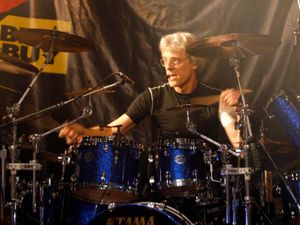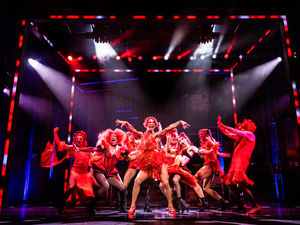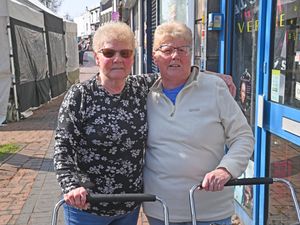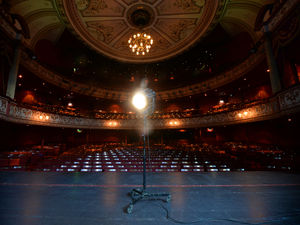Rock star’s life beyond Police
He’s a bona fide rock star, the sort of head-turning, headline-generating, household name who was inducted into the Rock And Roll Hall of Fame before today’s music stars had even been born. Stewart Copeland became an all-time great after recruiting Sting and Andy Summers into his band, The Police, in 1977.

They enjoyed four consecutive number-one studio albums, winning Grammy and BRIT Awards, and selling a cool 75 million records.
Enjoying number-one hits with Message In A Bottle, Walking On The Moon, Don’t Stand So Close To Me, Everything Little Thing She Does Is Magic, and the peerless, multi-platinum Every Breath You Take, The Police became one of the most influential bands that Britain has ever produced.
For a while, they were the biggest group in the world, before disbanding at the height of their fame in 1986 and periodically returning for one-offs and a reunion tour in 2007, which was then the highest-grossing in the world.
Copeland was far from done. After The Police first disbanded in 1986, he began composing soundtracks for cult and blockbuster movies, starting with Grammy-winning Francis Ford Coppola’s Rumblefish.
He’s spent the subsequent near-four decades at the forefront of contemporary music, as a rock star and acclaimed film composer, and across the worlds of opera, ballet, chamber, and world music.
More recently, he published two autobiographical books and unveiled Police Deranged For Orchestra, a remarkable, orchestral reimagining of The Police’s best works. A polymath and creative tour de force, Copeland is anything but ‘yer average rock star’.
“It’s been quite a ride,” he says, modestly as he looks back across the remarkable terrain during his 72 years on Planet Earth.
His path to greatness may have been inevitable. He grew up in America and the Middle East to a Scottish archaeologist mother, Lorraine, and an intelligence agency father, Miles Jr, who was a spy and one of the founding members of the CIA.
His older brothers, Miles III, and the late Ian, had equally starry careers. Miles managed The Police, founded a record label, IRS, that released REM and The Go Go’s, among many others, while Ian, was responsible for breaking a new wave of British bands in the USA, including The Cure, Simple Minds, The Police, and many, many more.
“My eldest brother, Miles, pretty much brought the English New Wave invasion to America,” he reflects.“Between him and Ian, they single-handedly did it. Miles was the record company guy and manager, Ian was the agent. They were both learning in London, cutting a swathe.
“Miles came to America and started IRS Records, which gave us The Bangles, The Go-Go’s, REM etcetera etcetera. Sadly Ian died, we lost him to melanoma in 2006, which we believe was due to Agent Orange in Vietnam. I miss him every day.”
Music was in the Copeland family’s blood. Stewart’s father was a jazz aficionado and the first record that his youngest son bought was Help! by The Beatles. The family was living in Beirut at that point and a friend of Stewart’s brought it back from a trip to England. Copeland loved The Beatles, The Stones, and more.
“I loved The Kinks, even more,” he says. “They were my number one thing. The Stones were big in the Copeland household and were representative of Ian’s black sheep world.
“Ian used to say ‘Those guys are so gnarly, they could take a cigarette and inhale the whole thing – a complete burn-out – in one breath’. Those dudes probably took three sugars in their tea, that’s how we viewed them.”
Music became the driving force in the young Stewart Copeland’s life. An epiphany came when he was playing in a band in England, at Millfield School, as its drummer. He was 12 years old and noticed a girl, Janet Roberts, grooving to his beat.
“She was a woman, a goddess, so far out of the reach of this budding 12-year-old. She was dancing to my groove. That was an empowering mojo. I was playing in the band and she was dancing and I could not believe that I was causing her to move suggestively.
“It was a big epiphany, it grew me up. I was the runt of the litter but banging on the drums turned me into an 800lb Silverback, swinging through the trees.”
A second epiphany came a few years later, at Wells Cathedral, where he was playing drums during a school Christmas service. The voices, floodlights, and majestic acoustics were transcendent.
“I was 15, and it was like God had landed right there. I couldn’t believe it. I was an unbeliever and still am. But goddamit. That was so emotionally and artistically powerful that I was completely entranced and marked by it, forever.
“Mr Fox, the music teacher, pointed his finger at me to play drums. I started: Boom-da-da-da-da-dar. Boom-da-da-da-da-dar. For a moment, I was leading this magnificent artistic enterprise that I’d just been absorbing so profoundly.
“I was now the boss of it, carrying it, leading it, the helmsman of it. That told me that there was indeed a higher purpose in music, higher even than 15-year-old girls called Janet.”
Copeland became a tour manager and joined the 1970s prog rock band Curved Air. By 1977, he’d formed The Police and soon found himself in the charts. A year later, under the pseudonym Klark Kent, he enjoyed more success, before disbanding that project and focusing on The Police.
The rock business has rarely seen success like it. By 1979, The Police were conquering the world.
Copeland says: “The story there is just a bunch of statistics. It is quite repetitive. One stadium looks just like another, really, and we were there for two albums’ worth, which was probably two or three years.
“The interesting thing for me about that era is the world of fame and what that looks like. It’s about what having an out-sized avatar, looming over you, at all times, looks like. You’re not yourself, standing there in the room. There’s this huge avatar of preconceived notions about this guy with your name and your face.
“Life’s guardrails are removed and that’s why so many come a cropper because they are not limited by the normal rules of social intercourse.
“By the way, that’s the negative side of it: the effect it has on people. The phenomenon itself is incredible. It’s such good fun.
“You do something, you get an immediate response. You bang something, 80,000 people cheer. That shamanism is a lot of fun. But all of the tension around it, the travel, the tension on the afternoon of a show, that’s all tedious.
“It was everything we ever dreamed of and more, yet there was a strange sense of disquiet. There was a strange sense of vertigo.
“That’s the best word I can think of to describe the fact that we were just flying high over humanity and it was really wonderful to be the centre of that attention.
“But there’s a point where there’s such a thing as too much love, too much adoration, and that becomes oppressive. I made a film, Everyone Stares, about what that felt like. It was sort of unsettling. We could handle it, because we were young and egotistical and confident. But it was expected that there would be an anxiety along with it.”
The Police weren’t impervious to the temptations that success brings.
“When you ask how did I cope, that pre-supposes that there was a problem at all times. You know, most of the time it didn’t take any coping because we were fine and everything was great. Of course, there were drugs involved too, temporarily.
“We soon realised that cocaine was rampant at the time, but it wasn’t really for us. We quickly observed that everybody turns into a fool when they’re doing that – including me – so that didn’t last.
“We just lived it. It was the only life we’d ever known. Andy had had other lives and, to some extent, and I’d had a separate life with Curved Air.
“We were in our late 20s, by that time, so we’d had some lived experiences. But really, for the next eight years, that was all we knew. We were riding that rocket ship.”
When the rocket ship landed, amid the blur of arguments and recriminations that are part of being in the world’s biggest band, Copeland found other outlets.
“The Police were not birds of a feather. Sting runs quiet and deep whereas I am noisy and shallow. But more specifically, music has a different function in our lives. We make it for different reasons. We think about it by different means; I never listen to lyrics, Sting’s all about writing songs. I’m all about the riff. He’s about the meaning of the song and how everything supports the song. I’m saying no, the song should support the riff. The song is some icing that goes over this cool riff. That’s just how I listen to music. I’m not a song guy. That’s my instinct.
“The recordings with The Police had become hell, so I went off to record a film score for Francis Coppola. I was struck by the relief, the sheer joy, of that music. The lack of carping and judgment and tension was incredible.
“To just be making music my goddam self was such a pleasure. Francis would come and say: ‘Great, great, great.’ It was sheer heaven to learn that there was a world outside of The Police. It was very enticing.”
Over time, that world grew. Indeed, in some ways, Copeland’s life began after he’d left The Police.
He wrote soundtracks before moving on to ballet, starting off with King Lear for the San Francisco Ballet. The pressure and expectation of life in The Police fell away, too.
“Composing was an interesting transition because on the one hand, I was in the band, I was master of the universe, I was one of the golden ones.
“And in the band, life was hell. The Police was like a Prada suit made out of razor blades. Life was hell in the band. Outside the band, I was an employee. I worked for hire. I was a composer.
“People paid me money and I worked for them. I was a hired gun. I was working by myself in a studio creating music for money. Two different things. Guess which one made me happier.”
He was prolific, writing more music in a decade that most musicians manage in a lifetime.
He was able to indulge his passion for horses, returning to the games of polo he’d enjoyed at school, at Millfield, and developing a very expensive habit for buying expensive animals.
“I was soon deeply enthralled by polo. Instead of a cocaine habit, I had a horse habit by which I don’t mean heroin. I would go to Argentina to buy horses, to play my ass off down there and buy a couple of horses, send them back to England. And it was just the perfect way to enjoy an English summer. And then in the winter, I’d be back in LA earning the money to pay for those damn horses.”
He continued to play around the world, most notably in Italy, the UK, and the USA, while composing soundtracks, making films, and winning even more Grammy Awards. There were two books, too, which dealt with his remarkable life, and in autumn he’ll undertake his first spoken word tour: Has He Said Too Much?
In a fascinating “Evening With”, he will talk about his incredible life as a performer, musician, entertainer, and writer.
In a remarkable career, spoken word is one of the few creative formats he’s yet to pursue. He has a whistle-stop, 13-date UK tour lined up for autumn – with one show selling out on the day tickets went on sale and the rest now almost sold out. Given his success in so many other creative genres, spoken word is a format in which he’s sure to excel.





